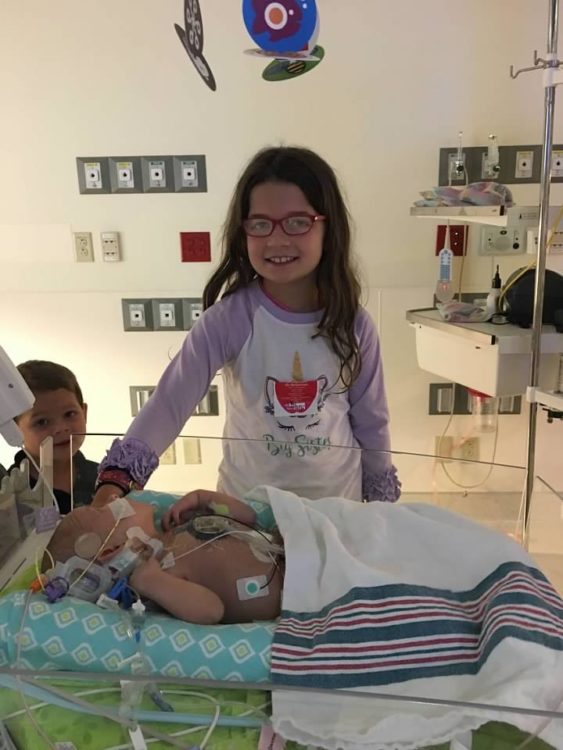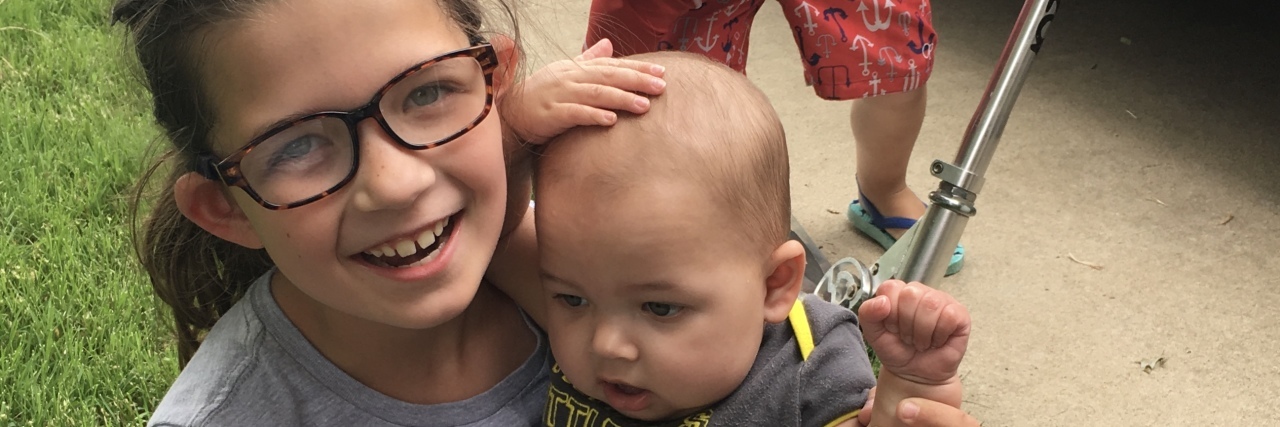“How am I going to tell my older two kids that their brother isn’t going home this week as we thought, and that he may not go home at all?” I pondered as I sat helplessly waiting out the hours until our sweet baby, Peter, would have open-heart surgery, simultaneously wishing time would stand still in this moment and also speed up so we could get our child’s heart repaired and healed.
At our doctor’s suggestion, our entire family was on the way to the children’s hospital where Peter had been since shortly after birth. Earlier that day Peter had been moved from his NICU room to the PICU to prepare for surgery. This weekend would be the first time our kids (then 7 years and 3 years old) had seen him intubated, sedated and with multiple IV lines. It was heartbreaking for me as a parent, and I had no idea how our big kids would react.
As a parent, preparing oneself for a critically-ill child’s hospital stay or surgery can be all-consuming. However, additionally preparing siblings to understand and cope with what their brother or sister is going through can be downright overwhelming. When Peter was born, he didn’t even come home from our local hospital before being transferred to the nearest children’s hospital, which was over two hours away from our home. That hospital stay ended up being eight months long, where Peter underwent five catheter procedures, three open-heart surgeries, a heart transplant, and three other non-heart related procedures.
Caring for our older children while Peter was inpatient was challenging, but just as important as making sure Peter was receiving the best care. These are some of the things that helped us.

1.Ask for a ChildLife specialist or someone trained in talking about what happens in the hospital in a kid-friendly way. ChildLife specialists can help provide resources for talking with siblings about what is happening to their impatient brother or sister, from child-friendly books to dolls with similar anatomy or devices as the patient. They can also bring activities and toys to occupy siblings during those long, boring hours in the hospital. Our wonderful ChildLife specialists brought books to help our older two understand the NICU and also provided several crafts. Yes, there may have been some paint projects by our 3-year-old going on in Peter’s PICU room from time to time!
2. Involve siblings as much as possible. It is natural for parents to be consumed with the information, decisions, and sheer magnitude of care for their inpatient child. It is also easy for siblings to fear being forgotten or left out. Older siblings may not feel a connection yet with their new brother or sister. Their source of stress may stem more from separation from parents and fear of displacement in the family than their sibling’s poor health. Reassure siblings that they are still important and loved, that you are still there for them, and no matter what happens, you will face it together as a family. We tried to send the basic message “This is hard and it might be scary but we will face this together.”
Make it a priority, as much as possible, for siblings to visit the hospital and interact with their brother or sister. This might look like drawing a picture to hang prominently in the hospital room, reading or showing a book, or giving a special or beloved stuffed animal or blanket. Encourage siblings to make a connection by saying, “Your brother can hear your voice — recite the poem you learned in school. Tell him about the picture you drew.” Another way to engage siblings is to invite close friends or extended family to love on them. This might look like an aunt can taking a sibling for ice cream after school, or out to play on the playground near the hospital.
3. Be honest and encourage questions. We answered their questions with enough information to explain things adequately and satisfy their curiosity, but were careful not to overshare graphic medical information or theoretical scenarios. We were clear about the fact that Peter was very sick. Our kids didn’t know what a heart defect was (and my husband and I didn’t either, until Peter), but we shared, “Peter’s heart is sick because he has something called a heart defect. With this kind of sickness, Peter needs to be in the hospital so doctors can help his heart to get well. It might take a long time. We want to make sure that Peter’s heart is healthy before he comes home.”
4. Don’t make promises you can’t keep. Sometimes siblings may wonder if their brother or sister is going to be OK, or when he or she will come home. Address these concerns directly, but avoid making concrete promises that you have no real control over keeping. At one point, Peter was scheduled to be discharged after three weeks in the NICU. It didn’t happen, and he ended up in the hospital for several more months.
5. Kids may not be freaked out by the same things you are. Our older children visited Peter’s bedside before his first open-heart surgery when he was intubated, and also after surgery when he was on ECMO (life support). Seeing a baby with so many tubes and cords was intense, scary, and utterly overwhelming. I was concerned that our kids would be scared by everything on and around their brother. Imagine my surprise when one of the first things they commented was, “Oh look, he has bears on his pillow.” Older children may be more disturbed by the evidence of critical illness. It can be scary for anyone to witness that. Some children may not feel comfortable at the bedside. Validate their feelings, encourage them to visit, and if they need a break or more time to get used to the hospital, give it to them.
Breathe and do the best you can. Having a child in the hospital is one of the most stressful experiences a parent can go through. During this exceedingly uncertain time, many of us long for something or someone to tell us what to do, how to act, how to make sense of everything transpiring around us, and how to simply survive. Unfortunately, there is no magic wand or one-size-fits-all handbook, no set of strategies or script that works for all families in all situations. Hold all of your babies close and love them the best you can.

